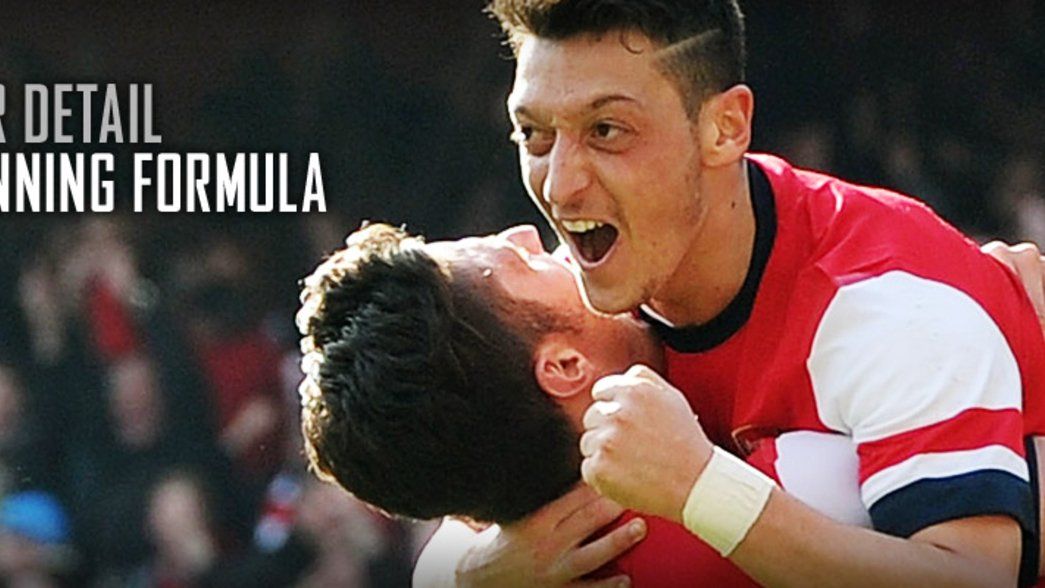Arsenal rarely do things the easy way, and the victorious FA Cup run was a peculiar sequence of victories considering the nature of the opposition.
The Gunners struggled to overcome Wigan Athletic and Hull City at Wembley, yet had convincingly defeated Tottenham, Liverpool and Everton to get there. It was an eventful journey.
It seems a long time ago now, but the star of the opening two rounds was 18-year-old German winger Serge Gnabry. In the 2-0 third-round victory over Tottenham, he started on the right because Theo Walcott was handed an opportunity up front, in a match that was sadly his last of the campaign.

Serge Gnabry impressed in the FA Cup win over Spurs
Wenger had such faith in Gnabry that he started again in the fourth round, a 4-0 victory over Coventry, in Arsenal’s most convincing yet arguably most forgettable victory of this cup run. Gnabry again starred, taking the corner which resulted in Lukas Podolski’s second goal.
Tougher tests were to come, and Arsenal’s 2-1 victory over Liverpool in the fifth round was hugely significant psychologically, considering the Gunners had been thrashed 5-1 at Anfield the previous weekend.
Arsenal showed their tactical flexibility, and learned their lessons from that defeat. Liverpool had consistently counter-attacked down the flanks at Anfield, and therefore full-back duo Nacho Monreal and Carl Jenkinson stayed in very deep positions, occupying that space. With Mikel Arteta and Mathieu Flamini deployed together to protect the defence, Arsenal were very solid, only conceding after a harsh penalty decision went against them.
As for the attacking performance, Alex Oxlade-Chamberlain played what could now be considered the ‘Gnabry role’, charging forward from right-sided positions. He was man of the match, outplaying Steven Gerrard, the player he idolised as a youngster, and constantly forcing the Liverpool skipper into clumsy fouls. More crucially, Oxlade-Chamberlain scored the first, and created the second for Podolski.
The sixth-round victory over Everton was notable for a fine performance by Mesut Ozil, and his combinations with Cazorla, his fellow wandering playmaker.
The opener was a perfect example. Cazorla had been causing Everton right back Seamus Coleman positional problems, with the Irishman attempting to stick tight, but Cazorla drifting infield and dragging him out of position. At one point, Coleman moved towards Cazorla, then drifted away, and then found himself in no-man’s land when Cazorla received possession for a second time. He could neither stop the pass nor occupy his zone, and Ozil wandered into Coleman’s right-back position to receive a pass from Cazorla, and calmly open the scoring.
Cazorla kept supplying him with passes towards the left, as the graphic (right) demonstrates, while Ozil also teed up Olivier Giroud to register an assist in the closing stages.

Mesut Ozil scores against Everton
The key feature of the semi-final against Wigan was Wenger’s second-half decision to switch to a 4-4-2, throwing on Olivier Giroud alongside, rather than in place of, Yaya Sanogo, with Podolski sacrificed. It’s rare to see Arsenal with two up front these days, but the change put pressure on the Wigan backline, which eventually forced Per Mertesacker’s crucial equaliser, before Arsenal triumphed on penalties.
That experience proved crucial in the final against Hull, where Arsenal again found themselves behind. Wenger once more switched to two up front with Podolski taken off, and again a centre back - this time Laurent Koscielny - grabbed the equaliser. Giroud and Sanogo ran the channels relentlessly, which caused Hull’s back three problems in wide areas.
The decisive factor, however, was Wenger’s introduction of Jack Wilshere and Tomas Rosicky at half time in extra time. With both sides exhausted by this stage, Wilshere and Rosicky provided an injection of tempo, Arsenal’s passing became more penetrative, and Aaron Ramsey provided the winner in the 3-2 victory.
The Wales midfielder missed the majority of the FA Cup run through injury, but as Arsenal’s Player of the Season with 58 per cent of the supporters’ vote, it was fitting that he made such a crucial contribution to the FA Cup triumph.
Copyright 2025 The Arsenal Football Club Limited. Permission to use quotations from this article is granted subject to appropriate credit being given to www.arsenal.com as the source.




